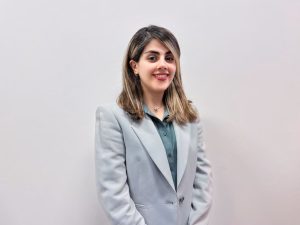Young researchers shape our future. Bringing their innovative ideas into our projects, they contribute not only to the excellence of research of the University of Luxembourg’s Interdisciplinary Centre for Security, Reliability and Trust (SnT), but also to our impact in society. They take our research to the next generation.
In this edition of the series, we feature Rafieh Mosaheb and her research on electronic voting systems and quantum computation.
Rafieh Mosaheb, doctoral researcher at the Applied Security and Information Assurance research group (APSIA), gave us some insights into the research project she is working on, reflected on how the project will shape the future, and shared her future plans with us.
Rafieh, what are you working on in your research?
We are working on secure e-voting systems: It is important that these satisfy two properties. The first is privacy, which means that no one shall be able to link a vote to the voter. The second is verifiability: Each voter must be able to confirm that his or her vote is reflected in the result of the election. Achieving privacy and verifiability together is particularly challenging, especially when considering the threat posed by quantum computers. In our research, we are working on designing a quantum-safe e-voting system.
What is the motivation for this project?
To vote in Luxembourg today, we need to go to the voting booth in person, write our vote on a piece of paper and put it inside the ballot box. However, there is a problem: What if an eligible voter is not present in Luxembourg during the election period? This problem was addressed in Luxembourg by introducing universal postal voting. However, the statistics for the last legislative election show that more than 2000 postal votes did not arrive on time. These missing votes could be a game changer for Luxembourg, since the competition margin could be as narrow as 100 votes per seat. Fortunately, according to the coalition agreement 2023-2028, the Luxembourg government is going to consider introducing e-voting. In the literature, there are many different proposals for designing secure e-voting systems. However, these systems mostly use classical cryptography. Such classical approaches are based on mathematical problems that are hard to solve in polynomial time for classical computers. However, upcoming quantum computers will solve these problems in polynomial time.
What is the solution in your project?
To achieve our goal of designing a quantum-safe e-voting system, we need post-quantum cryptographic primitives as the building block of our e-voting system. Unlike classical cryptography, post-quantum cryptography is based on mathematical problems that are believed to be difficult for a quantum computer to solve. However, we cannot simply replace the classical primitives with the post-quantum ones. Indeed, we must choose the approaches from the literature that are most compatible with our system and then thoroughly examine the new design to ensure that it is safe against both classical and quantum attackers.
How does this project shape the future?
Voting is essential to shape the future of a democratic country. Every eligible voter should have the same right in an election to choose their representatives, no matter where they are at the time of the election. This is possible using an e-voting system. However, we must consider that future quantum computers are a threat for today’s elections. In a world in which voters cast their votes via quantum-safe e-voting, they know that their privacy will not be compromised in the future by a quantum computer. Therefore, they show their true will without fear. Moreover, verifiability is provided under post-quantum assumptions.
What inspired you to work in research at SnT?
During my academic career, I explored avenues for my Ph.D. research, with the aim of applying my mathematical acumen in a practical context. This led me to Prof. Peter Ryan, a renowned authority in e-voting, who happened to have an available doctoral position at SnT. The vibrant research community under his leadership, coupled with the global environment of SnT, prompted my decision to embark on my Ph.D. journey here. At SnT, researchers engage with real-world challenges, which is in line with my conviction that practical relevance can coexist harmoniously with rigorous mathematical foundations.
What are your future plans?
I intend to broaden my focus by delving into the design of post-quantum primitives, a critical endeavour with direct relevance to e-voting systems. The paramount objective is to create an intuitive and voter-friendly system that remains impervious to quantum adversaries. Beyond the e-voting domain, the post-quantum era holds promise for enhancing security in any context involving secure data transmission. This research domain constitutes the cornerstone of my future aspirations.
About Rafieh: Rafieh Mosaheb earned her B.S and M.S degrees in applied mathematics from the Sharif University of Technology in 2015 and 2017, respectively. She was a junior researcher at the University of Tartu in Estonia in the department of CS from 2018 to 2021. Rafieh worked on the design of quantum algorithms for reinforcement learning problems. She joined SnT in 2021 to pursue her Ph.D. in quantum-safe e-voting under the guidance of Professor Peter Ryan.
